
An SEO AI writer is a tool that uses AI to generate content optimized for search engines. By analyzing data, keywords, and user intent, these tools can help create everything from blog posts to meta descriptions in a fraction of the time it takes a human. With over 86% of SEO professionals now integrating AI into their strategies, understanding these tools is no longer optional, it’s essential for staying competitive. The right SEO AI writer can help you produce more content, rank for a wider range of keywords, and scale your organic growth faster than ever before.
This guide is for anyone looking to leverage AI for better SEO results. Whether you’re a startup founder, an e-commerce manager, or a marketing agency, you’ll find actionable insights to help you navigate the world of AI powered content creation.
Who This Guide Is For
This guide is designed for business owners and marketers who need to produce consistent, high quality content to drive organic traffic. It’s particularly useful for:
Small and Medium Businesses (SMBs): Owners and small marketing teams looking for an affordable way to scale their content marketing and compete with larger companies.
Startups and SaaS Companies: Founders and marketers who need to generate a high volume of optimized content to build authority and attract users quickly.
E-commerce Stores: Managers who need to create unique product descriptions, category pages, and blog content to improve visibility in a crowded market.
Marketing Agencies: Teams looking for scalable solutions to fulfill content orders for clients without massively increasing headcount.
How We Evaluate SEO AI Writers (Methodology)
Choosing the right SEO AI writer requires looking beyond just the ability to generate text. A great tool should integrate seamlessly into your workflow and demonstrably improve your search rankings. Our evaluation focuses on several key criteria:
Output Quality and Relevance: How well does the tool generate accurate, readable, and contextually relevant content that aligns with search intent?
SEO Specific Features: Does the tool offer built in features for keyword research, SERP analysis, content structure optimization, and internal linking suggestions?
Ease of Use: How intuitive is the user interface? A simple workflow is critical for teams to adopt a new tool quickly.
Customization and Control: Can you customize the tone of voice, add specific brand guidelines, and easily edit the generated content?
Integration Capabilities: Does the writer connect with other essential tools in your stack, like WordPress, Google Search Console, or other SEO platforms?
Pricing and Value: Does the pricing model offer a good return on investment based on the features and the volume of content you can produce?
Top 10 SEO AI Writer Tools (2025)
Now that we’ve covered the essential features to look for in an AI-powered SEO tool, let’s dive into the top contenders for 2025. The following list represents the best of the best, each selected for its ability to generate high-quality, optimized content that aligns with modern search engine algorithms. These tools are grouped together because they not only streamline content creation but also offer advanced features like keyword integration, competitor analysis, and real-time optimization suggestions to enhance search visibility.
1. Surfer AI
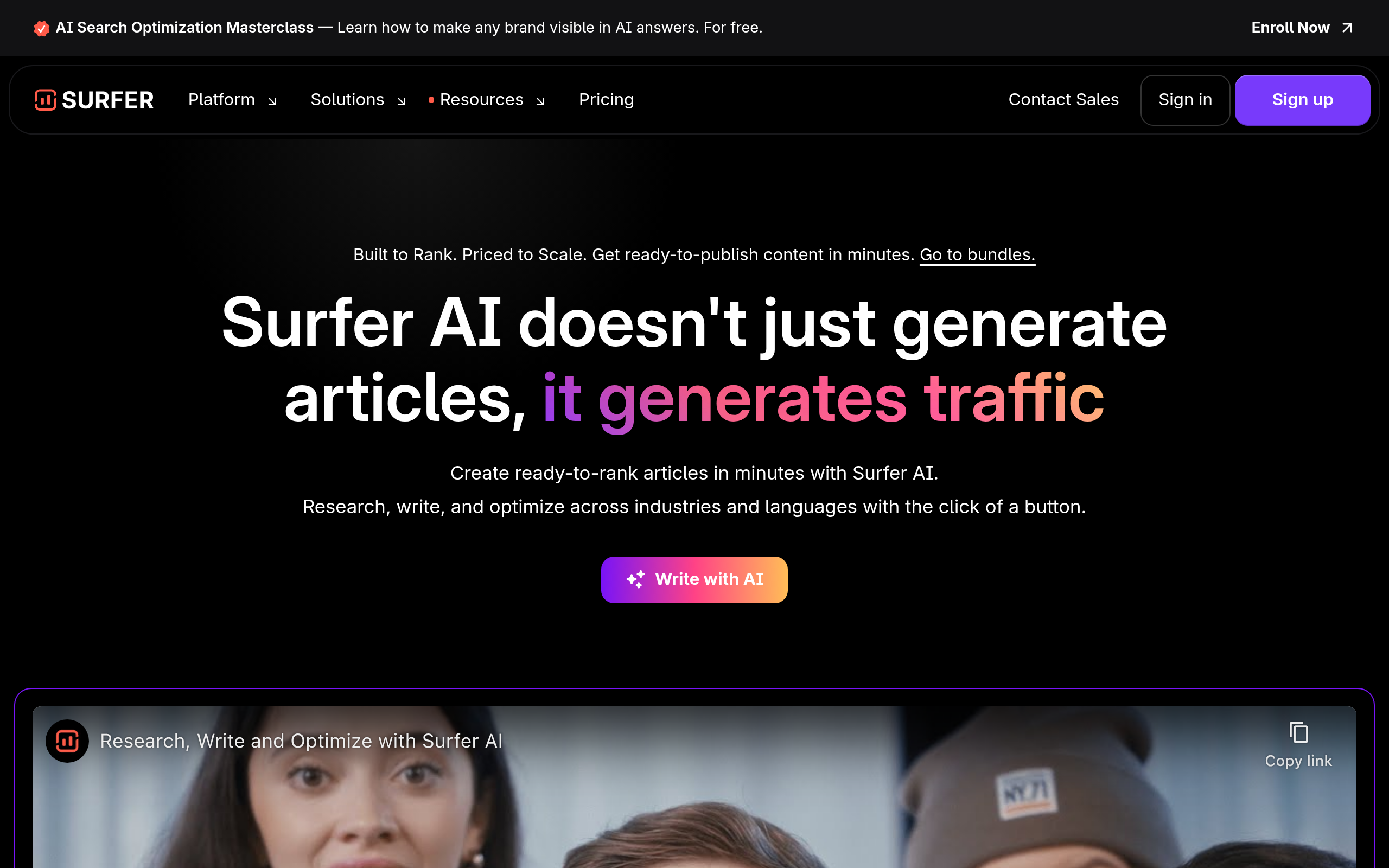
Surfer AI is an SEO‑first writing system that turns a single keyword into a SERP‑aligned draft. For content teams and agencies, it condenses research, drafting, and on‑page optimization into one flow, becoming the engine that powers rank‑ready production.
Key SEO capabilities: Real‑time content scoring, keyword gap analysis, AI‑generated outlines, one‑click internal linking, deep SERP/entity analysis.
Scale & operations: Bulk article queues, direct publishing, integrations with Google Docs, WordPress, and Chrome.
Workflow (keyword → publish):
Plan topics with Topical Map to uncover gaps.
Generate an AI draft after customizing outline and tone.
Optimize with Content Score and auto‑insert missing terms.
Add automated internal links to strengthen structure.
Publish to WordPress and track performance.
Pricing & plans: From $99/month ($79/month annual) for 5 AI articles and 30 Content Editor credits. Includes a 7‑day money‑back guarantee; AI article top‑ups available.
Best for & verdict:
Best for: SEOs, content teams, and agencies scaling optimized long‑form content.
Verdict: Excellent throughput and SERP alignment with clear ROI; the main constraint is monthly AI article credit caps, which may require top‑ups for high‑volume teams.
2. Koala AI
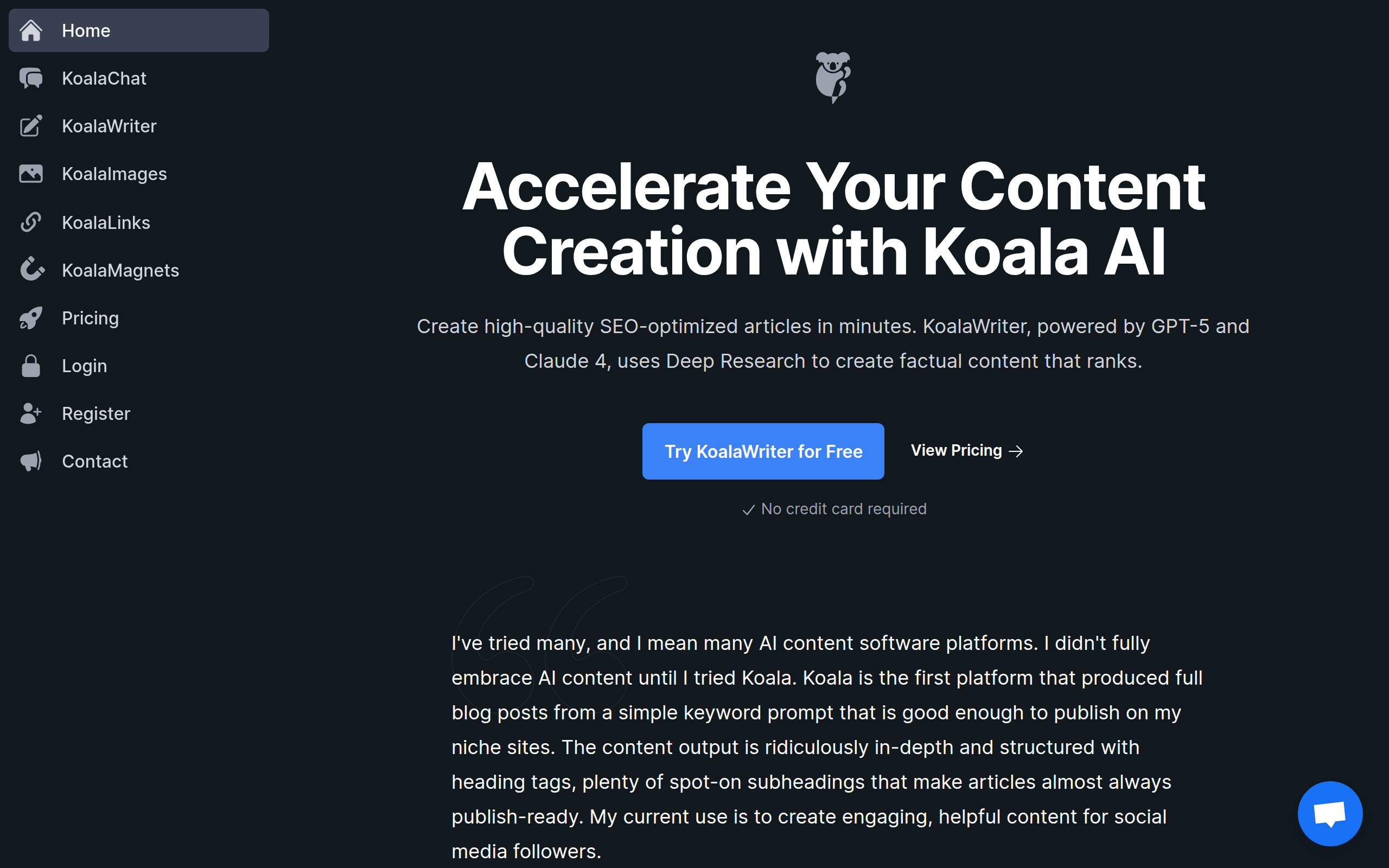
Koala AI is built for affiliate publishers, content teams, and agencies who want SERP‑aware articles at speed. It analyzes live results, assembles optimized outlines, and injects the right keywords, slotting neatly into the write‑optimize‑publish layer of a growth stack.
Key SEO capabilities: SERP/entity analysis, real‑time data with citations, full outline editor, automated internal/external linking.
Scale & operations: Bulk article generation, 1‑click publishing to WordPress/Shopify/Webflow, API and Google Sheets integration.
Workflow (keyword → publish):
Enter a target keyword to generate a SERP‑driven outline.
Refine the brief, enable auto‑linking, and set source rules.
Generate the draft and publish to your CMS in one click.
Pricing & plans: Starts at $9/month for 15,000 words. Professional ($49/mo) unlocks auto internal linking and deeper research. Scales to 10M+ words/month; premium models can double credit usage.
Best for & verdict:
Best for: SEO teams, affiliate publishers, and agencies wanting automated, SERP‑driven long‑form content.
Verdict: Smoothly bridges research, drafting, and publishing with strong ROI; lack of a native content score is the key caveat.
3. Bramework
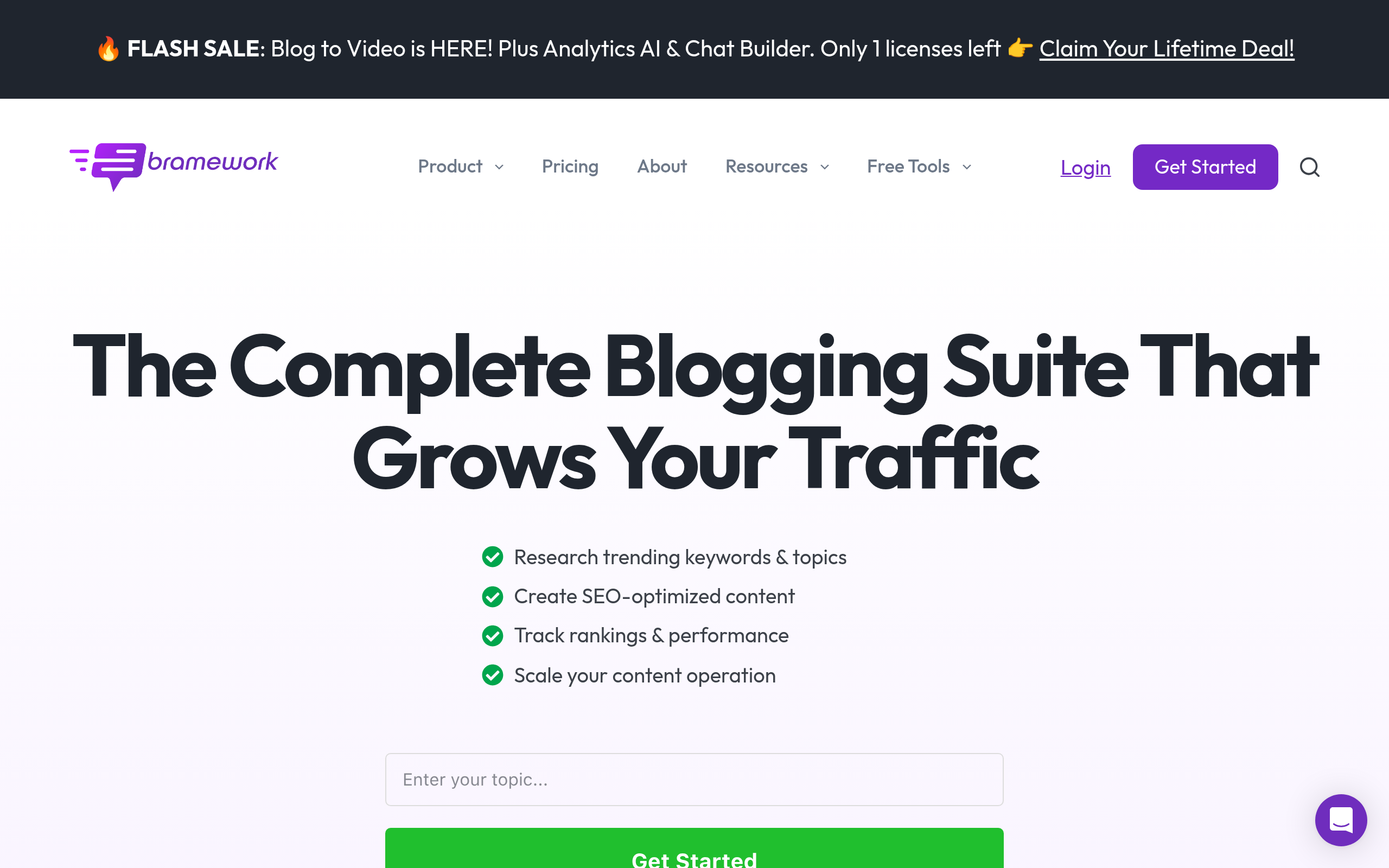
Bramework is an all‑in‑one AI blogging assistant for bloggers, freelancers, and agencies chasing organic growth. It connects keyword research, SERP‑informed drafting, on‑page guidance, and WordPress publishing so you can produce rank‑ready posts end‑to‑end.
Key SEO capabilities: Keyword Analyzer with SERP data, First Draft PRO for competitor‑based outlines, real‑time on‑page suggestions, plagiarism check, GA/GSC insights.
Scale & operations: Direct WordPress publishing; exports to PDF/HTML/DOCX.
Workflow (keyword → publish):
Research topics via Keyword Analyzer.
Build a SERP‑driven brief with First Draft PRO.
Create a full long‑form draft in one click.
Refine with the built‑in SEO Analyzer.
Publish to WordPress and track via GSC.
Pricing & plans: Grow starts at $29/month ($19/month annually) with 4 long‑form post credits, 100k AI words, and 2 seats. Pro raises to 16 credits with unlimited words; credit‑based long‑form drafting can cap throughput.
Best for & verdict:
Best for: Bloggers and content agencies needing an end‑to‑end SEO drafting flow.
Verdict: High output of optimized posts; the long‑form credit system is the main limiter for volume publishers.
4. Wordplay

Wordplay is a long‑form AI writer for SEO publishers and agencies who care about speed and scale. Its bulk generation modes and WordPress plugin make it a fast bridge between your keyword research and your CMS.
Key SEO capabilities: Multiple long‑form modes (Guided, Bulk CSV, Outline), bulk FAQ creation for PAA/snippet targeting.
Scale & operations: Native WordPress plugin for bulk import, scheduling, and publishing.
Workflow (keyword → publish):
Import a CSV of keywords and titles.
Generate drafts in bulk via Title or Bulk CSV Mode.
Use Guided Mode for high‑value posts to control the outline.
Push drafts to WordPress and schedule via the plugin.
Pricing & plans: Lifetime access from a one‑time $99 for 7,500 words/month. Tiers scale by word count on a rolling 30‑day window. Includes a 5,000‑word trial.
Best for & verdict:
Best for: Affiliate site builders and SEO teams focused on high‑volume WordPress publishing.
Verdict: Excellent raw throughput; pair with a separate on‑page scoring/SERP analysis tool for best results.
5. AI-Writer
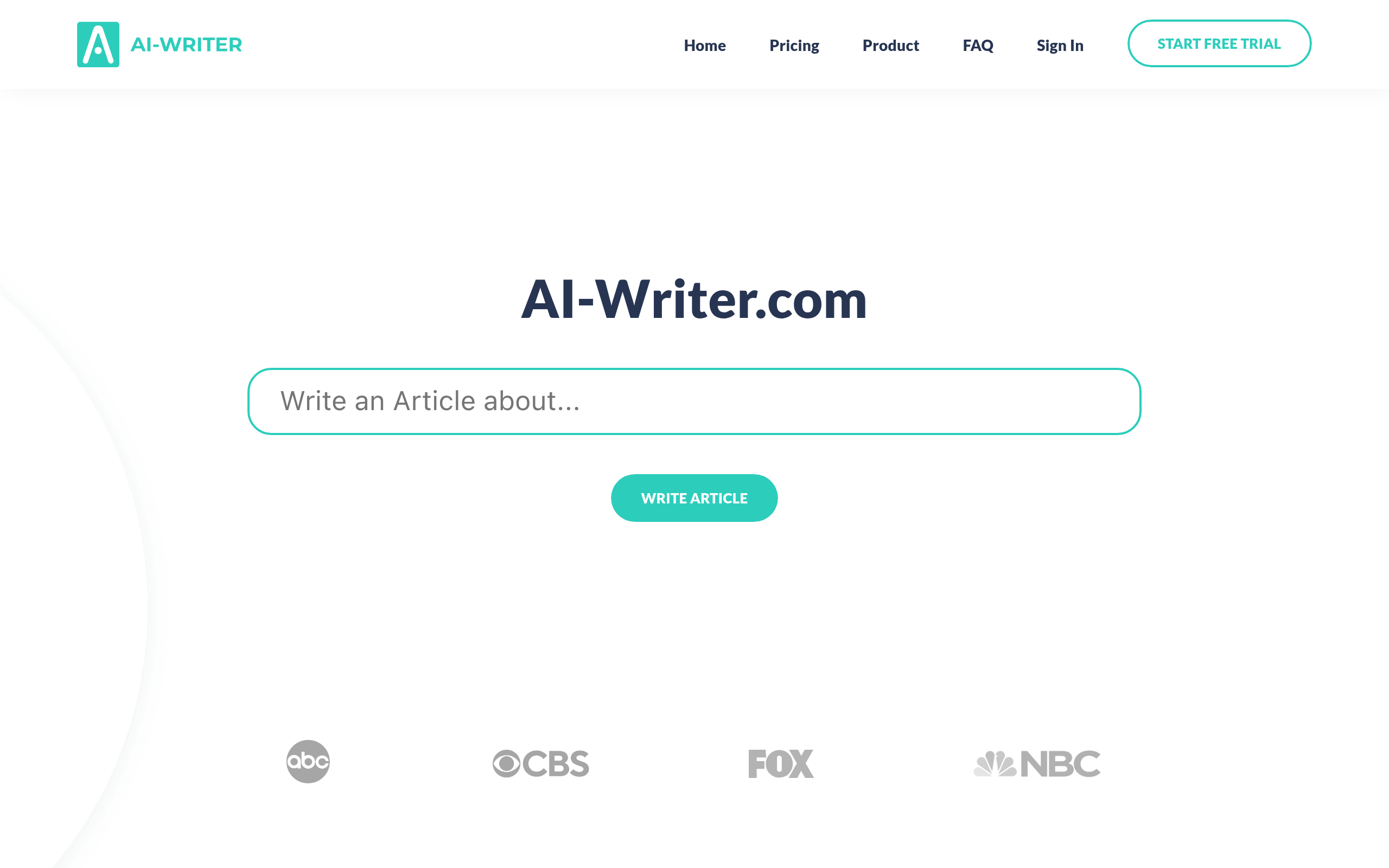
AI‑Writer focuses on SEO content you can verify. For teams and agencies that want fact‑checkable long‑form drafts, it produces articles with citations sourced from fresh web context, fitting neatly between keyword research and your CMS.
Key SEO capabilities: Verifiable citations, SERP‑informed topic/keyword suggestions, customizable outlines with per‑section word counts.
Scale & operations: No direct CMS/Docs integrations; copy‑paste required.
Workflow (keyword → publish):
Use Topic Suggest to find SERP‑informed queries.
Build a custom outline and set target keywords.
Generate the draft and verify sources in the fact‑check panel.
Refine copy and add internal links manually.
Publish in your CMS and track performance.
Pricing & plans: Starts at $29/month for one user. Tiers scale by seats and monthly article caps (about 40 on Basic). Includes core features and a 7‑day free trial with no credit card.
Best for & verdict:
Best for: SEO teams needing citation‑rich drafts for quick fact‑checking.
Verdict: Strong first‑draft engine; absence of native content scoring and CMS integrations means you’ll likely pair it with other optimizers.
6. Writesonic
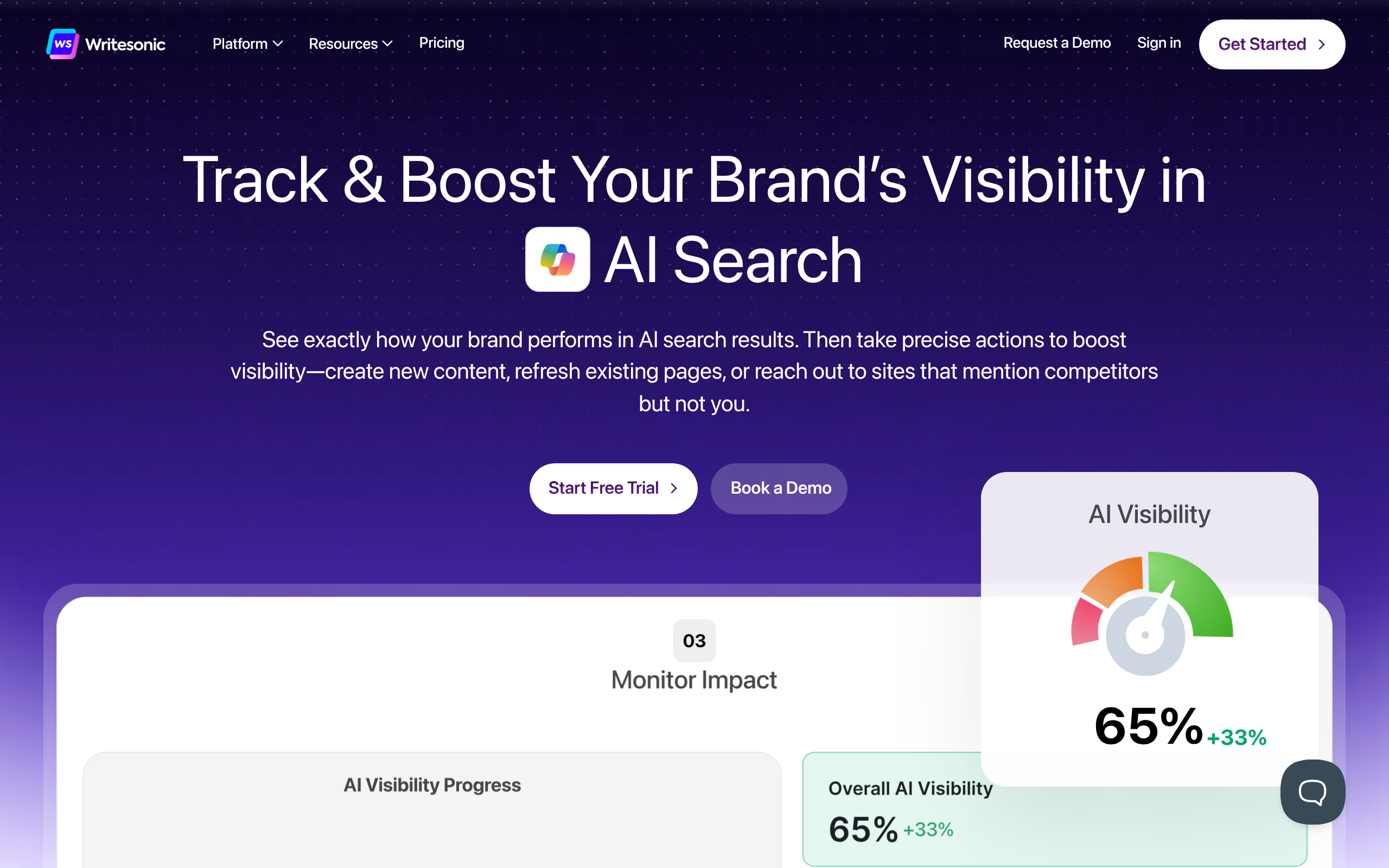
Writesonic is an AI writing platform for marketers and SEO teams scaling rank‑worthy content. It blends a long‑form generator with on‑page guidance, keyword intelligence, briefs, and visibility tracking across AI search engines like ChatGPT to tie content work to growth.
Key SEO capabilities: Real‑time content scoring, competitor keyword gaps, AI‑powered outlines/briefs, automated internal linking, SERP/entity analysis.
Scale & operations: Bulk CSV generation, direct WordPress publishing/scheduling, integrations for Google Docs (via Zapier), Chrome, and Surfer.
Workflow (keyword → publish):
Research keywords/competitors to generate a brief.
Draft with the AI writer using live SEO scoring.
Layer in long‑tails and auto internal links.
Publish to your CMS with metadata.
Track via GSC and AI search visibility.
Pricing & plans: From $49/month for 15 articles; higher tiers raise article caps (up to 200/mo), add team seats, and advanced AI search tracking. Free trial includes one article; 7‑day refund policy.
Best for & verdict:
Best for: SEO teams and agencies scaling long‑form while monitoring Google and AI search visibility.
Verdict: A capable engine for high‑throughput content with measurable ROI; watch article/audit caps on lower tiers.
7. Hypotenuse AI

Hypotenuse AI helps content teams and e‑commerce brands ship publish‑ready articles fast. Its SEO Pro Mode leans on live SERP data for briefs and optimization, while Content Detective adds cited facts, tightening the loop from keyword to CMS.
Key SEO capabilities: SERP/PAA‑driven outlines, on‑page keyword gap analysis, Content Detective fact‑checking with citations, auto internal/external linking, plagiarism checker.
Scale & operations: Bulk generation, one‑click publishing to WordPress/Webflow, Shopify/PIM integrations for product content.
Workflow (keyword → publish):
Use SEO Pro Mode to craft a SERP‑informed outline.
Run Content Detective for citations per section.
Generate the draft with automatic internal/external links.
Optimize on‑page elements via SEO Helper.
Publish to your CMS.
Pricing & plans: Starts at $29/month for 50,000 words. Advanced SEO features (SERP analysis, auto‑linking) live in Blog Pro from ~$230/month (180k words, 3+ seats). Free trial; words don’t roll over.
Best for & verdict:
Best for: SEO teams and e‑commerce brands needing fact‑checked, SERP‑informed long‑form content.
Verdict: Reduces research and optimization time with clear ROI; note that top SEO features are gated behind higher‑tier plans.
8. Jasper

Jasper is a marketing‑focused AI writer built for on‑brand content at scale. Its SEO punch comes from “SEO Mode,” which pairs with Surfer’s on‑page scoring and term suggestions, fitting cleanly alongside Surfer and Semrush in a growth stack.
Key SEO capabilities: Surfer integration for content scoring/terms/outlines, schema and FAQ generation, plagiarism checks, internal linking and meta optimization via agents.
Scale & operations: Chrome, Google Docs, and Word integrations; WordPress publishing via Zapier/Make.
Workflow (keyword → publish):
Set Brand Voice and Knowledge guardrails.
Build a brief in Jasper Chat with Surfer/Semrush data.
Draft in SEO Mode, optimizing against Surfer’s score.
QA with plagiarism checks and add internal links.
Publish via integrations.
Pricing & plans: Pro starts at $59 per seat/month (annual) with a 7‑day free trial; mainly single‑user. Business (custom) adds more seats, API, and advanced agents.
Best for & verdict:
Best for: Teams already using Surfer for on‑page SEO.
Verdict: Fast, on‑brand drafts with solid optimization via Surfer; lacks native keyword research and rank tracking. For a deeper dive, see our Jasper AI review.
9. Copy AI
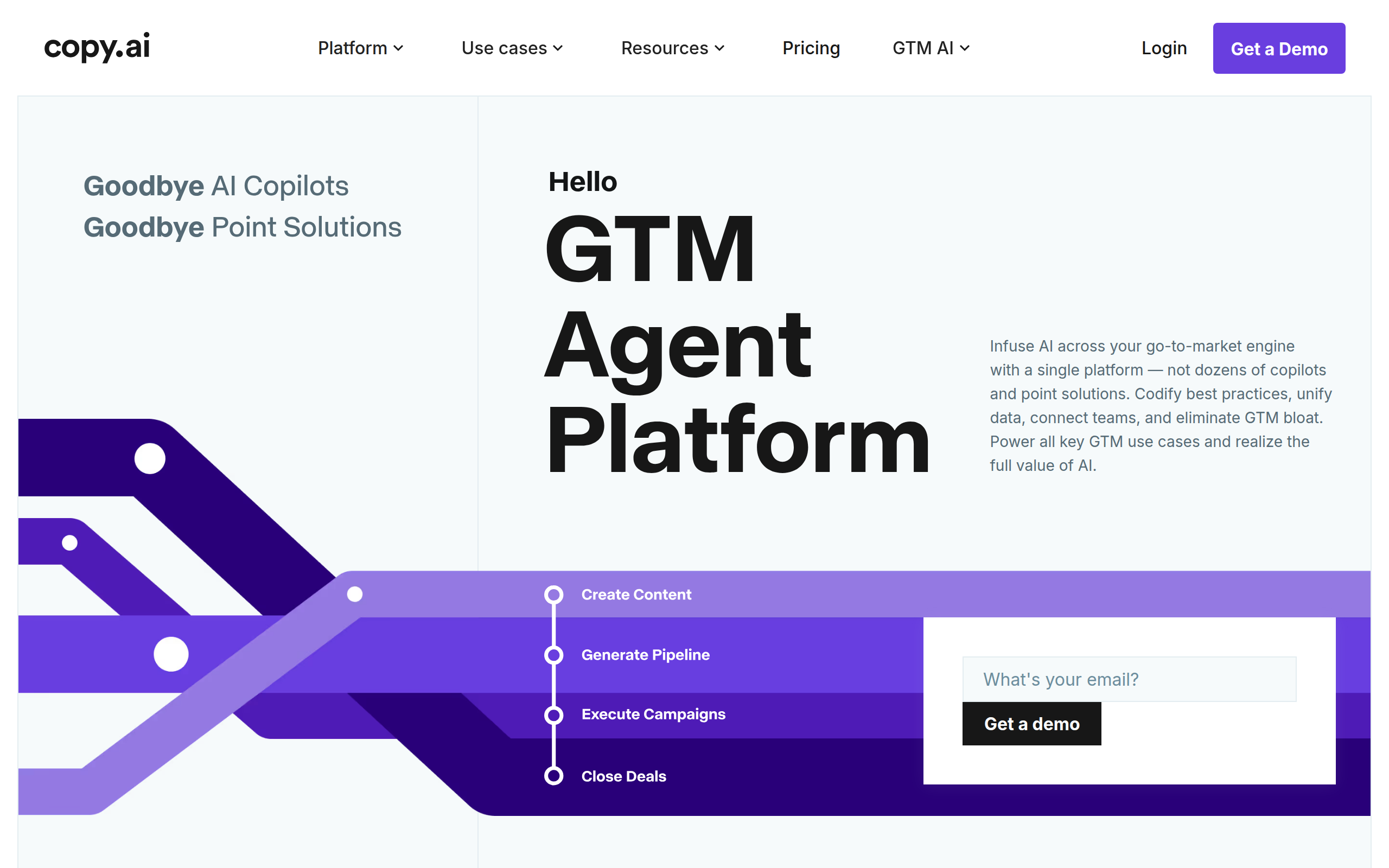
Copy.ai is a GTM‑oriented platform that automates the journey from keyword to draft with consistent brand voice. It acts as an orchestration layer between research tools and your CMS, assembling data‑driven briefs and long‑form content at scale.
Key SEO capabilities: Automated SERP‑driven briefs, outlines, competitor text extraction, brand voice enforcement, GSC data integration.
Scale & operations: Bulk processing from CSVs, scheduled runs, Zapier/API into WordPress and Google Docs.
Workflow (keyword → publish):
Generate a brief from a keyword to analyze the SERP.
Enrich with cited research and brand knowledge.
Draft a full post from the enriched brief.
Distribute via scheduled bulk runs.
Monitor with GSC data to plan refreshes.
Pricing & plans: Free plan allows 2,000 chat words. Paid from $29/month; the $249/month Agents plan unlocks 10,000 monthly workflow credits that gate automation and bulk throughput.
Best for & verdict:
Best for: SEO/content teams automating research‑backed briefs and drafts at scale.
Verdict: Great for systematized pipelines; lack of real‑time content scoring and credit‑gated throughput are the trade‑offs.
10. Surfer
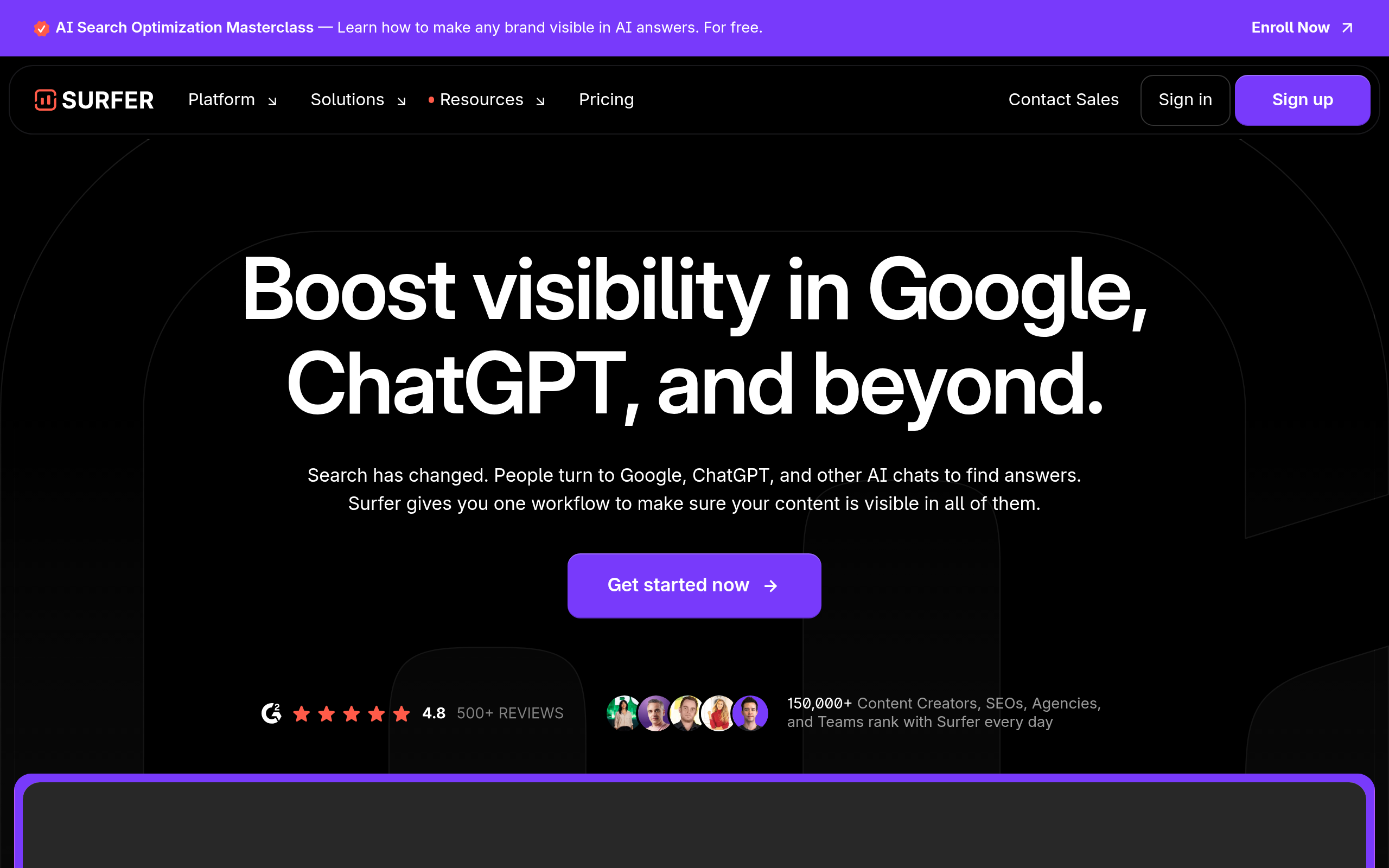
Surfer is a data‑driven on‑page optimization suite for SEOs and growth teams. It delivers real‑time SERP analysis, content scoring, entity‑informed briefs, and topical mapping, powering a scalable content engine you can plug directly into production.
Key SEO capabilities: Content scoring, SERP‑driven term suggestions, AI‑generated outlines/briefs, automated internal linking, SERP/entity analysis.
Scale & operations: Bulk AI article queue, direct WordPress scheduling/publishing, Google Docs/Chrome/Zapier integrations.
Workflow (keyword → publish):
Plan clusters with Topical Map to expose gaps.
Generate a SERP‑informed brief or full AI draft.
Optimize in Content Editor to raise the score.
Add automated internal links to relevant pages.
Publish via integrations and track rankings.
Pricing & plans: Starts at $99/mo ($79/mo annually) with a 7‑day money‑back guarantee. Tiers vary by Content Editor and AI article credits, plus team seats; watch for throughput caps and add‑on costs.
Best for & verdict:
Best for: On‑page SEO at scale with data‑backed briefs and high‑velocity drafting.
Verdict: Excellent for improving on‑page quality and speed; main drawback is juggling usage caps and paid add‑ons.
How to Choose the Right SEO AI Writer for Your Stack
Selecting the perfect SEO AI writer depends entirely on your specific goals, team size, and budget. There’s no single “best” tool for everyone. Here’s a simple framework to guide your decision:
Assess Your Primary Needs
First, identify your main content bottlenecks.
For high volume blog content: Look for tools with strong long form capabilities and one click article generation.
For marketing copy and landing pages: Prioritize tools with persuasive writing templates and brand voice customization.
For a comprehensive solution: Some businesses find that a managed service is more effective than a standalone tool. For instance, a service like Rankai bundles human led keyword strategy with AI content production, offering a more hands off approach to SEO.
Consider Your Team’s Expertise
The technical skill of your team matters. Some AI tools require significant expertise to operate effectively, while others are built for beginners. If your team is new to AI, choose a tool known for its user friendly interface and strong customer support.
Evaluate the Cost vs. Benefit
While standalone AI writing tools can save time, they still require a human to handle keyword strategy, editing, and on page optimization. A recent study found that marketers save an average of three hours per piece of content using AI. Calculate this time savings against the tool’s subscription cost. Compare this with an all in one service that handles the entire workflow, from strategy to publication and even rewrites, for a flat monthly fee.
Practical Workflow: Human-Led, AI-Assisted SEO Content
The most successful SEO teams don’t replace humans with AI, they augment them. AI is incredibly efficient at handling repetitive, data driven tasks, but human expertise is still essential for strategy, creativity, and ensuring quality. A human in the loop workflow ensures you get the speed of AI without sacrificing the quality that builds trust with your audience and Google.
Here is a practical, five step workflow:
Human Led Strategy: An SEO expert or strategist should always lead keyword and topic selection. This person defines the target audience, analyzes search intent, and creates a detailed content brief. This initial human insight ensures the AI’s output is strategically sound from the start.
AI Powered First Draft: Use your chosen SEO AI writer to generate the initial draft based on the human created brief. This is where AI shines, transforming an outline into a structured article with headings, paragraphs, and initial keyword placement in minutes.
Human Review and Refinement: This is the most critical step. A human editor must review the AI generated draft for factual accuracy, tone of voice, and readability. Plan to spend time refining the text to add unique insights, real world examples, and a genuine brand voice. This is what separates helpful content from generic spam.
On Page Optimization: While the AI may have included keywords, a human should handle the final on page SEO. This includes optimizing the title tag, meta description, internal links, and image alt text to ensure everything is perfectly aligned.
Publish and Monitor: After the content is published, a human should monitor its performance using tools like Google Search Console. For services that offer a “rewrite until it ranks” guarantee, like Rankai, this step triggers a continuous improvement loop if the content doesn’t perform as expected.
Pitfalls to Avoid and Best Practices
While an SEO AI writer is a powerful asset, misusing it can harm your rankings. Here are some common pitfalls and how to avoid them:
Common Pitfalls
Publishing Raw AI Output: Never publish content directly from an AI tool without a thorough human review. Unedited text often contains factual inaccuracies (“hallucinations”), awkward phrasing, and a generic tone that readers and search engines can easily spot.
Ignoring E-E-A-T: AI is not an expert. Your content must still demonstrate Experience, Expertise, Authoritativeness, and Trustworthiness. This means adding unique insights, citing credible sources, and including clear author information.
Keyword Stuffing: Some AI tools can get repetitive with keywords, leading to unnatural text that harms user experience. Always read the content aloud to ensure it flows naturally.
Producing Generic Content: If you use the same generic prompts as everyone else, you’ll get the same generic content. The goal is to provide unique value, not just add to the noise.
Best Practices
Use AI as an Assistant: Treat your SEO AI writer as a very fast assistant, not a replacement for a writer. Use it for brainstorming, outlining, and drafting, but leave the final polish and strategic oversight to a human.
Develop Detailed Prompts: The quality of your output depends on the quality of your input. Provide the AI with a clear outline, target keywords, desired tone, and specific examples to guide its generation.
Fact Check Everything: AI models can confidently present false information. Always verify any statistics, facts, or claims before publishing.
Prioritize a Human in the Loop: The most effective and sustainable strategy is a hybrid one. A human led, AI assisted approach, whether managed in house or through a service like Rankai, ensures both scale and quality.
Conclusion: Match Tools to Needs; Keep Your Unique Voice
An SEO AI writer can be a game changing tool for scaling your content production and driving organic growth. However, the tool itself is only one piece of the puzzle. The real winners in the age of AI will be those who master the collaboration between human expertise and machine efficiency.
Whether you choose a standalone tool or a fully managed service, the core principle remains the same: use AI to handle the heavy lifting and empower your human experts to focus on strategy, creativity, and building a brand that truly resonates with your audience.
Ready to see how a blended AI and human expert approach can triple your content output and drive real results? Explore how Rankai delivers on page SEO that ranks.
FAQ
What is an SEO AI writer?
An SEO AI writer is a software tool that uses artificial intelligence, specifically natural language processing, to create content that is optimized for search engines. It can help with tasks like keyword research, topic ideation, drafting articles, and writing meta descriptions.
Can Google detect AI generated content?
Google’s focus is on the quality and helpfulness of content, not whether it was written by a human or an AI. They do not penalize content simply for being AI generated. However, they do penalize low quality, unhelpful, or spammy content, which is often a risk with unedited AI output.
Will an SEO AI writer replace human writers?
No, at least not in the foreseeable future. AI is best used as a tool to assist human writers, not replace them. Human oversight is crucial for strategy, fact checking, creativity, and ensuring the content aligns with a brand’s unique voice and E-E-A-T (Experience, Expertise, Authoritativeness, Trustworthiness) standards.
How much does an SEO AI writer cost?
The cost varies widely. Some tools offer free plans with limited features, while premium subscriptions can range from around $50 to several hundred dollars per month, depending on the features and word limits. Managed services that bundle the technology with human expertise, like Rankai, typically offer a flat monthly rate for a complete content solution.
How do I ensure my AI content is unique?
To ensure uniqueness, always start with a detailed and specific prompt. After generating a draft, have a human editor review and rewrite sections to add unique insights, personal anecdotes, real world examples, and a distinct brand voice. Running the final text through a plagiarism checker is also a good practice.
Is AI generated content effective for SEO?
Yes, it can be very effective when used correctly. Studies have shown that a majority of businesses using AI for content have seen improved SEO results. The key is to use it as part of a human in the loop workflow to produce high quality, helpful, and well optimized content that serves user intent.